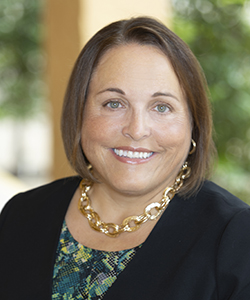Kirsten K. Davis
Professor of Law
B.A., The Ohio State University
JD, Michael E. Moritz College of Law at The Ohio State University
PhD, Arizona State University, Hugh Downs School of Human Communication
Phone: 727-562-7877
Email: [email protected]
Office: CR-208 (Gulfport)
Courses
Professional Responsibility, Legal Research and Writing I & II, The First Amendment, Legal Discourse and Rhetorical Theory, and Legal Writing with Generative AI

Biography
Dr. Davis is a native Ohioan and a farm kid. She graduated summa cum laude and Order of the Coif from The Ohio State University College of Law. While at Ohio State, she was a member of the Ohio State Law Journal and chief justice of the Moot Court Governing Board.
Kirsten Davis is a Professor of Law and serves as the University’s Faculty Fellow for Generative Artificial Intelligence and Higher Education through Fall 2025. A Southeast Ohio native, she holds an undergraduate degree in Communication from The Ohio State University, a law degree from The Ohio State University Moritz College of Law, summa cum laude and Order of the Coif, and a PhD in Human Communication from Arizona State University Hugh Downs School of Human Communication. Prior to joining the faculty at Stetson, she was a federal judicial clerk, attorney in private practice, and a faculty member at the Arizona State University Sandra Day O’Connor College of Law.
Dr. Davis’s work focuses on the intersection of legal communication and legal ethics. Most recently, she has been studying the impact of generative artificial intelligence on legal communication, legal ethics, and higher education. This past year, she has given talks on generative AI to law faculty, law students, administrators, lawyers, and judges. She is leading a group of over 500 law professors who are exploring the impacts of Generative AI on legal writing education and practice. Her course, Legal Writing with Generative AI, was one of the first of its kind to be offered to law students. Her essay, A New Parlor is Open: Legal Writing Faculty Must Develop Scholarship on Generative AI and Legal Writing, argues that generative AI represents the beginning of a paradigm shift in legal writing and identifies the “big issues” of legal writing that will need scholarly investigation. https://www2.stetson.edu/law-faculty-research/a-new-parlor-is-open-legal-writing-faculty-must-develop-scholarship-on-generative-ai-and-writing/
Dr. Davis has served on the board of directors of the Association of Legal Writing Directors and the Legal Writing Institute. She is a past chair of the Association of American Law Schools Annual Meeting Program Committee and of its Section on Women in Legal Education. She is also a past Chair of the Florida Bar's Standing Committee on Professionalism and served on its Special Committee to Review Professionalism. She served as 2025 Program Co-Chair for the AALS Section on Technology, Law, and Legal Education. Currently, she is a member of the Legal Writing Institute’s AI Committee and the Florida Bar Association’s Standing Committee on Technology. She founded Stetson’s Institute for the Advancement of Legal Communication.
Davis has received Stetson’s Dean's Award for Extraordinary Service, its Award for Teaching Excellence, its Homer and Dolly Hand Award in Faculty Research, and its Dickerson-Brown Award for Faculty Excellence in Scholarship. She was recognized for her work in online education with the 2021 Stetson Board of Trustees COVID-19 Innovation Award.
In 2025, the Association of American Law Schools (AALS) Section on Technology, Law, and Legal Education selected her for its Inaugural Technology Mentorship Award. The ABA Legal Technology Resource Center named her to its distinguished Women of Legal Tech list for 2024. Most recently, the AALS Section on Legal Writing, Reasoning, and Research selected Davis for its 2026 Section Award, which honors an individual for an outstanding contribution to the field of legal writing, reasoning, and research.
Featured Publications
A New Parlor Is Open: Legal Writing Faculty Must Develop Scholarship On Generative AI And Legal Writing
This essay explains why generative AI represents the beginning of a paradigm shift in legal writing that requires scholarly exploration and presents some ideas for the “big issues” that will need investigation.
[Classical] Lawyers As [Digital] Public Speakers: Classical Rhetoric and Lawyer Digital Public Commentary
This article explores the problems and possibilities of lawyers’ digital rhetoric. The article is not a handbook of rhetorical techniques; rather it offers lawyers a rhetorical perspective on public commentary in a digital environment.
Rhetorical Criticism as Essential Legal Skill: Some Thoughts on Developing Lawyers as 'Public Citizens'
This article argues that teaching rhetorical criticism skills in law school can play a central part in giving lawyers the intellectual skills to perform their roles as fiduciaries of the rule of law and participatory democracy and to understand themselves as moral actors in the public sphere.
Additional publications are available on SSRN.